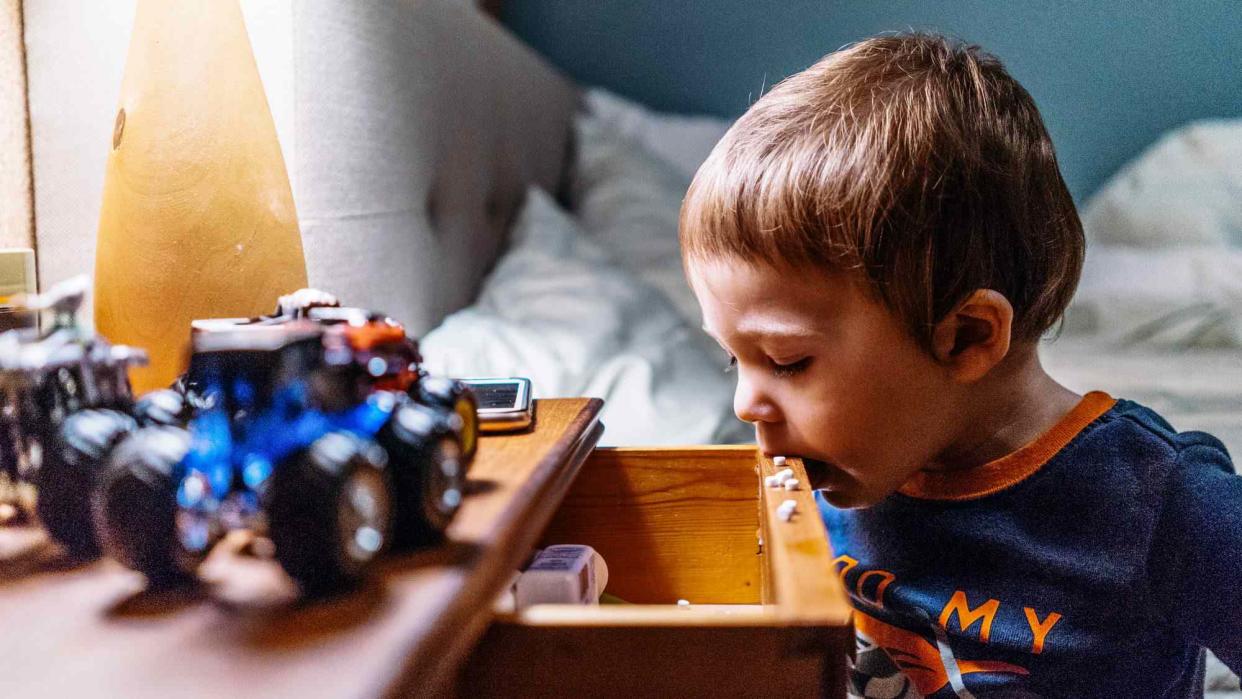Can You Overdose on Melatonin?

Medically reviewed by Sanja Jelic, MD
Though it's also a natural hormone in the body, melatonin is used in supplement forms (e.g., tablets or gummies) to help people sleep. With that in mind, you may be wondering if you can overdose on melatonin gummies. The short answer is yes, melatonin overdose can happen. Symptoms may include sleepiness and agitation.
Melatonin overdose has been known to occur in children, even in 1-year-olds and 2-year-olds, but it can happen to anyone. However, researchers are still trying to understand more about melatonin overdose. Here's what else to know about melatonin and its risks, including potential overdoses.
What Is Melatonin?
Melatonin is a hormone naturally produced by the body and controls the sleep–wake cycle. However, it's also sold over the counter as a sleep aid for adults and children. It's available in tablet, capsule, liquid, and gummy formulations.
How Much Melatonin Is Safe?
There isn't a standard dose of melatonin that's considered safe to take. However, taking up to 8 milligrams (mg) is a typical dose for adult users. Using this amount for the short-term, such as up to six months, may be okay for adults.
Can You Overdose on Melatonin?
You can overdose on melatonin, regardless of your age. Melatonin is usually non-toxic—even if you take a large dose.
Symptoms of Melatonin Poisoning
Signs of melatonin poisoning can mimic the side effects of general melatonin use. Symptoms that suggest you may have taken too much melatonin can include:
Agitation
Daytime sleepiness or drowsiness
Dizziness
Mild depression
Nausea
Melatonin Poisoning Signs in Children
In a Centers for Disease Control and Prevention (CDC) study looking at melatonin ingestion in children, most children who ingested melatonin (82.8%) didn't have any symptoms—but in the children who did show symptoms after melatonin ingestion, the gastrointestinal, cardiovascular, or central nervous systems were involved. About 1.6%—4,555 children—experienced more serious outcomes. Specifically, five children required mechanical ventilation, and two children died from the overdoses.
Treatment
There's no remedy for melatonin overdose. Instead, treatment may primarily involve supportive care. For example, one recommendation is for a reliable adult to watch over someone who has taken too much melatonin until they wake up and feel fully rested.
Also, the CDC study revealed that the 27,795 children who experienced symptoms were treated at a healthcare facility. Most were discharged soon after, but some needed further hospitalization (14.7%) and others required intensive care (1%).
Is Melatonin Safe?
Melatonin can be safe for adults when used for short periods and possibly safe for long periods. However, the FDA minimally regulates dietary supplements, which are not suitable for everyone. People with the following conditions or health statuses should avoid melatonin use:
Bleeding disorders
Breastfeeding status
High blood pressure
Pregnancy
Seizure disorders
Additionally, the supplement's effectiveness can depend on the type, dosage, frequency of use, and interactions with current medications. Consult a healthcare provider or pharmacist before starting any supplements, including melatonin.
Potential Risks
While taking melatonin is generally safe, there are a few risks to taking melatonin beyond a potential overdose. For one, melatonin may interact with other medications and supplements you may take, such as:
Caffeine
Diabetes medications
High blood pressure medications
Immunosuppressants, which suppress the immune system
Medications for blood clot prevention
Oral birth control pills
Seizure medications
Supplements with ingredients like aloe, garlic, ginger, prickly pear, and stinging nettle
Another issue with melatonin and other supplements is the unregulated vitamin and supplement industry. That means products may contain more of an ingredient or different ingredients than advertised. Research has shown that some melatonin supplements may contain 83%–478% more melatonin than what the label suggests—the most variation was found in chewable formulations of melatonin.
Is It Safe for Children?
Up to 3mg of melatonin is a regular dose for children for up to three months. If it's believed a child needs more than that dosage, always consult and work with a pediatrician regarding putting your child on any medications or supplements.
Preventing Melatonin Poisoning
To prevent melatonin poisoning, follow the instructions on the package. Also, consult with a healthcare provider before taking melatonin to determine if it's appropriate for you and how much you should take.
All medications and supplements—including melatonin—should be stored out of reach of children. If a medicine or supplement doesn't come in child-resistant packaging, it should be transferred to packaging that is difficult for children to get into.
A Quick Review
You can take too much melatonin, which may result in a melatonin overdose, and experience symptoms like sleepiness, headaches, and nausea. There are no specific treatments for melatonin overdose, but supportive care can be helpful. Talk with a healthcare provider before using these supplements, as they are not appropriate for everyone to use.
For more Health.com news, make sure to sign up for our newsletter!
Read the original article on Health.com.

